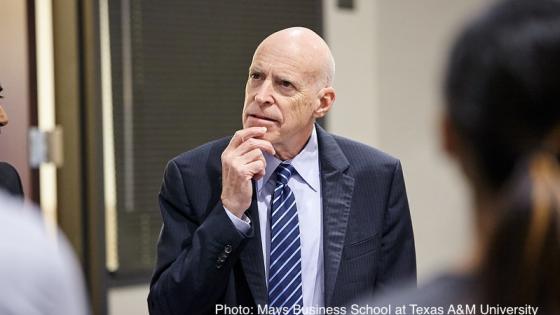Edward Lazear – ‘Eddie’ to those who knew him – was the consummate economist. He was a very smart man and surely would have been successful had he pursued a career in some other profession. But Eddie’s natural ability to see, analyse, and explain all the economics of any given situation was truly remarkable and a textbook example of comparative advantage. We were not there to verify this, but we are pretty sure that on the day he was born, Eddie weighed the costs and benefits of leaving the womb.
Eddie was born into a working-class family and grew up in Los Altos, California. After less-than-stellar academic beginnings in local schools, Eddie’s love for economics was kindled in his undergraduate years at UCLA. He went on to the PhD programme at Harvard. While he was there, Sherwin Rosen visited and had an early influence on Eddie (as Eddie described in a remembrance after Sherwin’s death).
Sherwin taught Eddie much about the Chicago view of economics. Eddie then became close with Richard Freeman, who joined Harvard as an assistant professor out of Chicago’s PhD programme while Eddie was in graduate school. Eddie’s main thesis advisor was Zvi Griliches, with Freeman on board, and together with Sherwin Rosen, all reflected the Chicago view that became Eddie’s soul as he moved to Chicago for his first job.
Eddie’s thesis and his first few papers after that were on traditional labour economics topics such as human capital investments, on-the-job training, and investments in education. This was excellent work that got him a position on the faculty at the University of Chicago’s Business School. Thus, his actual office was located in the intellectual home – the ‘Chicago School’ – that he had adopted in graduate school.
Eddie’s work took an important turn when he added the firm as an economic actor with his seminal paper, “Why is there Mandatory Retirement?” (Lazear 1979). Eddie argued that mandatory retirement was a commitment device that allowed firms and workers to write long-term contracts where workers were ‘underpaid’ relative to their marginal product early in their careers and ‘overpaid’ by an offsetting amount later in their careers. This gives both sides an incentive to invest in rent-producing behaviour and is enforceable because the worker is always owed more than she is worth (so has an incentive to stay) and the firm wants to keep its reputation for honouring such agreements.
Like all of Eddie’s papers, the contribution of the mandatory retirement paper is in the statement of the idea (in this case, the familiar graph where the marginal product of labour grows less steeply than compensation so that the early underpayment is offset by the later overpayment – see Figure 1 on page 1265 of the paper). Once he explains the idea in a sentence or two, Eddie hardly has to bother writing the actual paper because people all say, “Oh, yeah, that makes sense. I wish I had thought of that.”
And yet Eddie’s papers share the common methodology that a crisp theoretical model is what then propels a set of hypotheses that are borne out by the data. The testing of his predictions might occur in his paper, or in the thousands of papers written by others but derived from Eddie’s work.
Shortly after Eddie moved to Chicago, Sherwin joined him there and, while Eddie was still a junior faculty member, the two of them teamed up to write “Rank-Order Tournaments as Optimum Labor Contracts” (Lazear and Rosen 1981). This is another example of Eddie’s simple, insightful, and elegant modelling skills. Sherwin and Eddie point out that it makes sense to pay people based on relative, rather than absolute, performance as it gets rid of common noise factors. As they wrote, “Paying workers on the basis of rank order alters costs of measurement as well as the nature of the risk borne by workers.”
As we heard Eddie explain countless times, this has several critical managerial implications. For example, when noise in measurement is higher, the optimal prize for winning increases. This paper started a huge academic and practitioner literature on contests in promotion and pay. It is Eddie’s most widely cited paper and the one of which he was most proud.
A related line of research where Eddie made a huge contribution was the role of standard ‘piece rate’ pay systems. He wrote a number of papers on this but is probably best known for his case study of Safelite Glass. Through a former student, Eddie got data on the productivity of windshield installers before and after the company migrated from hourly compensation to paying installers on a per-unit-installed basis.
As he showed in “Performance Pay and Productivity” (Lazear 2000a), this change increased productivity by over 40% with about half the increase coming from increased effort on the part of installers and the other half coming from positive selection of more productive installers into the company (and negative selection of those who were less productive). This was one of the earliest papers studying data from within a single firm and inspired a wealth of papers looking at the relationship between pay and productivity at shoe factories, fruit farms, software companies, and many other organisations.
We could go on and on talking about Eddie’s great studies of how firms manage personnel policies (such as the skill-weighted approach to specific human capital, the ‘jack-of-all-trades’ view of entrepreneurship, and so on). We could also write a long chapter about his influential papers in other areas of economics (such as immigration and optimal classroom size).
And, if you have not read it before, we recommend Eddie’s argument on behalf of all economists that we are natural scientists, especially if you are looking for a way to offend your colleagues in other social sciences (Lazear 2000b). Eddie has a long list of recognitions from professional societies and honorary degrees to attest to the impact of his research.
But now we want to focus on Eddie the institution builder. Eddie founded The Journal of Labor Economics about 40 years ago and he was the Editor-in-Chief for the first 20 years. During that time, he took the journal from nothing to the leading journal in its field and one of the most impactful in all of economics. Eddie also founded the Society of Labor Economics, the leading professional organisation in its area.
Eddie created the economics sub-field of personnel economics, which is the rigorous study of how firms are run, simultaneously making the topic a popular MBA class and an expanding topic within economics. He started the Personnel Economics group within the NBER. At Stanford, he started the ‘Eddie Lunch’ where economists from all areas come together to hear about someone’s early-stage research. The Eddie Lunch is now drowning in its own success – as Yogi Berra might have said, “nobody goes to the Eddie Lunch anymore – there are too many people there asking questions.”
Over the years, Eddie had an impact on thousands of graduate students. He was a legend in the MBA classroom, where he could use integrals and still make it very clear why his messages had practical relevance. He is the only Stanford GSB professor ever to win the teaching awards for both the MBA and PhD programmes. Eddie’s former PhD students are now spread out widely in academic institutions throughout the world, passing his ideas along to the next generation.
Eddie was always attentive and on top of every detail in every seminar, interjecting with questions that cut right to the heart of the problem being addressed. We wish we had a dollar for every time we heard Eddie ask, at just the right moment, “Wouldn’t prices solve this?”
While his academic achievements were staggering, if you asked Eddie what he was most proud of in his career, his public service would have been at or near the top of the list. Eddie served as an advisor to many officials in US states, various federal agencies, and to governments around the world. But he got the greatest satisfaction, and faced the greatest challenges, during his time as Chairman of President George W. Bush’s Council of Economic Advisors. During the financial crisis of 2008, Eddie found himself leading more governmental stimulus and activity than any Chicago economist hoped to see in a lifetime.
We were also lucky to know Eddie the person – a true Renaissance man with wide interests and knowledge. Eddie loved riding motorcycles, skiing, windsurfing, and (maybe most of all) mountain biking. He and his wife Vicki were devotees of the San Francisco symphonies and opera. But Eddie also knew more about rock band The Who than their lead singer Roger Daltrey, as well as all the best lines from the movie My Cousin Vinny.
Eddie met Vicki in graduate school at Harvard. She had a long and successful career in economics in her own right, as well as solving the mathematics in the first part of the mandatory retirement paper (look at the acknowledgements in the paper). Together, they raised Julie who made Eddie happier and prouder than anything else we have mentioned.
For the two of us, as authors of this tribute to Eddie, he played important roles. For Paul, he mentored, supported, and promoted his work in the GSB at Stanford. For Kathryn, they met later in her career, co-authoring eight articles and co-editing two volumes, as well as co-teaching and then co-leading Eddie’s original NBER Personnel Economics group for nearly 20 years.
Shortly before he died, Eddie reflected on his life from what was a humble start. He said (channelling baseball legend Lou Gehrig) that he considered himself the luckiest man on the face of the earth. Maybe so, but he made much of his own luck, and he paid that forward – all of those whose lives were touched by Eddie were lucky for the time we had with him.
References
Lazear, E P (1979), "Why Is There Mandatory Retirement?", Journal of Political Economy 87(6): 1261-84.
Lazear, E P (2000a), "Performance Pay and Productivity", American Economic Review 90(5): 1346-61.
Lazear, E P (2000b), "Economic Imperialism", Quarterly Journal of Economics 115(1): 99-146.
Lazear, E P, and S Rosen (1981), "Rank-Order Tournaments as Optimum Labor Contracts", Journal of Political Economy 89(5): 841-64.




